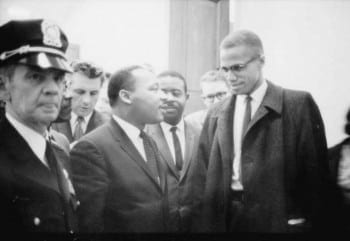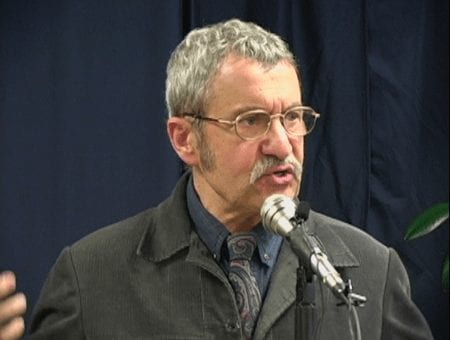
=By= Matt Meyer, Natalie Jeffers and David Ragland

The triple-threat crisis of racism, militarism and materialism continues to define the American empire: unprecedented levels of racially-biased incarceration, increasingly disempowering and divided educational systems based on race and class, and statistics which show that Blacks are 9 times more likely to be killed by police. Despite a President (in an extraordinary act of self-denial) proclaiming in his final major address that there is no Black America, the evidence suggests that we are living in a particularly dangerous period of time, particularly if you are or know a young person of African descent.
2015 was not only a year of fear, brutality and injustice, it was a year of sustained resistance that honoured not only a strong national Black radical politics of organising, but also helped cultivate a new and thriving, nonviolent international movement for Black Liberation. As we enter 2016, the Movement for Black Lives must navigate itself in uncharted territory and hazardous spaces, but is accompanied by a vigourous knowledge of self, a thriving and committed community of activists and organizers who are cognizant of the need for guiding principles and the creation of a Black Radical national policy platform.
The Movement is malleable – to be shaped and reshaped depending on the needs of both specific moments and long-term, community-based goals. At the core will remain three essential demands: divestment from racist systems and investment in Black communities; community self-control and community-centered decision making; and the creation of alternative Institutions and radical spaces which express and reflect one’s right to live freely. These principles are inspired by a re-imagination of what it means to build radical democracy, laid down by a generation of youth organisers like Martin Luther King Jr and Malcolm X, Ella Baker and Fannie Lou Hamer, Kwame Ture and Angela Davis, and so many others.
It is fitting that on Dr. King’s 2016 birthday weekend, an intergenerational, intersectional movement of Black radicals and their allies are collectively organising to reclaim the moment, using MLK’s tools of nonviolent civil disobedience and direct action to launch a “Year of Resistance and Resilience.” Coordinated actions taken across the US and the world will ensure that this birthday weekend is understood as a time for visible resistance to current injustices, not simply celebratory affirmations of past victories.
Building an Affirmation
Black Lives Matter is an ideological and political intervention in a world where Black lives are systematically and intentionally targeted for demise. It is an affirmation of Black folks as human, and an affirmation of our contributions to society, humanity, resilience, and resistance in the face of deadly oppression.
At the root of this movement is a critique of violence. At times this past year, it seemed that the empire commonly known as the USA has rarely been so divided. Alongside of the social divisions, however, it seems that the rising new movements may, at last, be in the process of uniting different struggles working across the many landscapes of oppression, and uniting philosophical approaches too often used to divide us.
The current movement emerging from the Ferguson uprising, #BlackLivesMatter and other Black Liberation formations have learned from the leader-focused movements of the past not to rely on single, charismatic, too-often-male leaders that centralize, mainstream or silo organizational life, principles or culture(s). Nevertheless, even though some youth organisers will say “This Ain’t Yo Daddy’s Civil Rights Movement,” the philosophical specter of past generations echo through modern debates about strategy and tactics. These include real differences of styles and preferences, including the efficacy of reform versus radical demands, the power of mass civil resistance and nonviolence versus the legitimacy and need for armed self-defense, and the different roles which solidarity and alliance-building can take. This differences, however, have too often been posited as do-or-die dichotomies, falsely suggesting that there is only one path to effective and lasting social change.
X Vs Jr
The images of Rev. Martin Luther King, Jr. and Minister Malcolm X are rolled out by the movement and their critics in equal measure. They swiftly and elegantly deliver historical visions which slot conveniently into particular, not-always accurate, not-often-useful, historical narratives. One is the Pro-Violence and Revolutionary, the other is Pacifist and Reformist.
We are too often instructed to forget the intersections where their actions, movements and messages met, and there is good reason why we are distracted from connecting these dots: to connect is to find new meaning in cooperation and collaboration between organising groups. Yet, there is much evidence we can draw from that bridge the gap between Martin and Malcolm, including one bright, smiling, brotherly, moment captured when the two men met and shook hands across the divides of their times. That moment – with two men committed to both racial justice and human rights for all, committed to an internationalism which understood the US empire and the struggle of Black folks in a global context, committed to an understanding that tactical differences should never stand in the way of principled unity – beckons us to a 21st Century imperative.
We must REFUSE TO CHOOSE between Martin and Malcolm. This time is our time to reimagine and practice revolutionary nonviolence.
Rejecting and Accepting the Past
While rejecting the representation of two myopic heteronormative male narratives of liberation, Malcolm and Martin offer a recognizable context to begin a critical conversation about what our Black liberation past has inspired, and what popular culture can diminish.
Scholarship and common sense have already laid down most of what we need to know. As each of those two giants engaged with the world outside the U.S. borders, they grew in understanding that the problem of the “Black” world within the U.S. could not be solved merely through U.S. legislative or political remedies, nor through a single ideological or tactical approach. They clearly understood that the reforms of their earlier days would not be sufficient in ridding the U.S. or the world of white supremacy which lay at its very foundation; a revolution – whether of values or of arms or of a combined social resistance – would be needed for true emancipation on a Global, diasporic scale.
There is, of course, a dualism here which we shouldn’t simply avoid: armed and nonviolent approaches suggest different types of tactical considerations with likely different results. Missing, though, in almost all past tactical debates, but present in the #BlackLivesMatter movement is the creation of spaces that develop a revolutionary and militant nonviolence mindset and discipline, borne of highly organized mass civil disobedience and resistant direct actions to “shut down and completely disrupt ‘Business as Usual’, dismantle racist systems, and transform institutions through acts of self-determination and reparations.
Most historians agree that Malcolm and Martin were killed for beginning to make transnational, strategic, and philosophical connections, and that the FBI’s Counter-Intelligence Program which hunted them both continues to this day, though in different names and forms. It continues to seek to “expose, disrupt, misdirect, discredit, or otherwise neutralize the activities” of all those struggling for Black liberation.
The US National security state went to outright war against the Black Panthers, their allies, and others who came after, but the spirit of the Panthers marches strong in the minds and on the t-shirts of youth organisers bearing such slogans as “Assata Taught Me.” It is also in the present, intergenerational radical learning spaces created to facilitate dialogue with the elders of past struggles.
By anchoring to the traditions of Black radical politics, the movement builders of today refuse to perpetuate the continued assassination of Dr. King, burying him in a soft-focused, nostalgic and “dreamy” 1963. We refuse to end King’s story with “I Have a Dream,” as if he never was a young radical who was imprisoned, beaten and discredited, as if he never grew into a powerful movement leader defying many advisors and funders by speaking out sharply against the war in Vietnam and in favor of economic justice for all. We refuse to go along with state-sponsored attempts to bury Black radicals behind bars as US political prisoners, or in exile with bounties on their heads, and so spotlight the words – sent from Cuba – of Black Liberation Army leader Assata Shakur. Her most recent writing implores us to remember that “this is the 21st century and we need to redefine r/evolution. this planet needs a people’s r/evolution. a humanist r/evolution. r/evolution is not about bloodshed or about going to the mountains and fighting… the fundamental goal of r/evolution must be peace…r/evolution is love.”
In August 1963, as hundreds of thousands were marching on Washington DC to assert that “jobs and freedom” were still necessary for the descendants of enslaved Africans one hundred years after the end of the Civil War, Martin declared that America had offered Black folks “a bad check,” one marked “insufficient funds” in the areas of liberty and justice. On that day, when Malcolm was suggesting that the march itself was a sell-out, a conscious person wanting to take action would have had to make a logistical choice: to go to DC or stay home. A few months later, in Malcolm’s “Message to the Grassroots,” he clarified his differences with the civil rights leadership, and sharpened his own definition of revolution. “The Black revolution,” he stated, “is world-wide in scope and in nature. The Black revolution is sweeping Asia, sweeping Africa, rearing its head in Latin America…Revolution overturns and destroys everything that gets in its way…Revolution is based on land.”
More than fifty years since those thunderous messages, we no longer need to make a choice. The mainstream history textbooks would like to freeze-frame Martin in 1963, having his dream and nothing more. They would like to cut Malcolm out altogether, or else freeze him in some internal extremist, Muslim-based, fratricidal debacle. Martin came closer to Malcolm in his concern for what might be described as reparations or redistribution of wealth. Malcolm’s attempt to take the US to the United Nations for its violation of human rights offers a glimpse into his strategic, peaceful, coalition thinking, similar to King’s gathering of international support and cross-movement, interfaith work.
New Moments, Nuances, New Movements
Theologian James Cone taught us to look beyond the white-washed images of Malcolm-versus-Martin. Student activist Ashoka Jegroo told us that today’s movements need not dichotomize those men as opposing sentinels. Charles Cobb and Akinyele Umoja and Sally Bermanzohn and others have provided detailed works showing the nuances involved in the real movements of the 1950s, 60s, and 70s, suggesting that today we can and must go beyond false dichotomies.
In 2016, we must do more than simply acknowledge that we need not choose between Martin and Malcolm. To be effective, we must actively engage in the texts of Baldwin and Fanon; Dellinger and Braden; Lee-Boggs, Butler and Lorde; as well as hooks and Abu-Jamal and West. We must learn from a diasporic history of resistance and rebellion, from Haiti, Trinidad and Jamaica; Ghana, Guinea Bissau and Mozambique; Chile, Costa Rica, and Brazil; India, East Timor, and Vietnam, and – yes – the streets of San Juan and Brixton. We must interweave, interconnect and intersect nuanced arguments, achievements and concerns, and be willing to critique and challenge one another as we reimagine society and explore our universe for new suns.
There is much debate about what makes for effective and transformative movement-building – on local, national, or transnational scales. This much at least, from the last half-century of history, seems clear: a merger of ideological and technical thinking will be needed, along with full access to and (re)distribution of all natural, material, and human resources. A revolutionary nonviolent praxis will require:
*A combination of reform and more radical measures, leading up to fully transformative and lasting change;
*A multiplicity of intersectional strategy and tactics that expand what we consider as nonviolence;
*A disciplined understanding and preparation for the fact that casualties and bloodshed occur in all revolutions, and that militarism on the part of revolutionaries is always a costly error;
*Massive training for mass organising between social, economic, political and environmental movements, by imaginative, creative, resistance-oriented means;
*Concrete, grassroots constructive programs, that seek to build new societies and alternative institutions, and that invest in Black communities and the communities of other historically oppressed peoples and nations;
*Explicit programs to eradicate white supremacy and hetero-normative patriarchy, with the goal of liberation for all people;
This is not to say that the U.S. today, despite the ebullient mood on some campuses, is – to use a favorite phrase of Kwame Ture (aka Stokely Carmichel) – “ready for revolution.” It IS to say that radicals today, across different struggles and movements, might do well to step carefully around the dividing lines of past decades. We must find intersections and opportunities that exist in these new spaces, building unity where our elders could not. As the U.S. empire shows growing signs of decline, lashing out and closing ranks at anything beyond the 1% ruling elite, opportunities for radical change – as well as for vicious backlash and repression – will emerge with growing frequency. Let us not allow our people’s movements to be divided, co-opted, or conquered – especially not along historic fault lines so clearly set up to divide and conquer us.
Liberation educator Paulo Freire noted that “violence is the tool of the master,” and feminist poet Audre Lorde reminded us that “You cannot dismantle the Master’s House with the Master’s Tools” So, let us reimagine new ways to build a society where Black people can live freely and dream, and let’s find, as Barbara Deming implored, “equilibrium” in our revolutionary process.
Constantly the hegemonic status quo re-equips to co-opt, capture, and destroy our dissent. Today’s movements must not seek to be “brought into the fold.” The fold can only hold a few, and we no longer want the morphine of acceptance. Let us speak Truth to Empire, like the people of Ferguson and like U.S. political prisoners have been trying to do. It is time to refuse to fight our grandfather’s battles, and refuse to be limited by unnecessary past choices and false dichotomies.
It is time to build power, unite, and win!
Matt Meyer is coordinator of the War Resisters’ International Africa Support Network, and serves as a representative of the International Peace Research Association at the UN; he is a New York City-based author and educator, locally affiliated with the Resistance in Brooklyn collective. Natalie Jeffers is the founder/director of Matters of the Earth, a global social justice organisation that places creative, innovative tools into hands to educate and empower people in organising, strengthening and building movements. She is a London-based activist with the Black Lives Matter movement. David Ragland is a co- founder/co-director of the Truth Telling Project based in Ferguson, MO, and assistant professor of Peace and Conflict Studies at Juniata College. He is also a Board member of the Peace and Justice Studies Association
Note to Commenters
Due to severe hacking attacks in the recent past that brought our site down for up to 11 days with considerable loss of circulation, we exercise extreme caution in the comments we publish, as the comment box has been one of the main arteries to inject malicious code. Because of that comments may not appear immediately, but rest assured that if you are a legitimate commenter your opinion will be published within 24 hours. If your comment fails to appear, and you wish to reach us directly, send us a mail at: editor@greanvillepost.com
We apologize for this inconvenience.

 Nauseated by the
Nauseated by the
vile corporate media?
Had enough of their lies, escapism,
omissions and relentless manipulation?
GET EVEN.
Send a donation to
The Greanville Post–or
SHARE OUR ARTICLES WIDELY!
But be sure to support YOUR media.
If you don’t, who will?
ALL CAPTIONS AND PULL-QUOTES BY THE EDITORS, NOT THE AUTHORS.


 Nauseated by the
Nauseated by the






